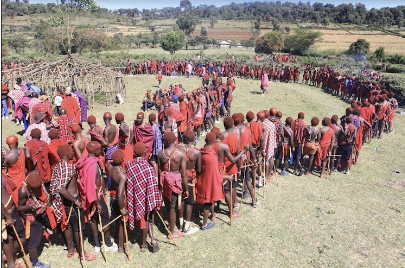In the vast expanse of Northern Kenya, a diverse array of pastoralist communities thrives, each contributing to a rich cultural tapestry. Among these communities, including the Samburu, Turkana, Pokot, Rendile, and Borana, a shared tradition known as moranism holds profound cultural significance.
This transition from adolescence to adulthood encompasses rites, rituals, and ethical codes that shape the identity and responsibilities of young men.
Moranism serves as a cornerstone for social cohesion, conflict mediation, and community resilience, particularly in Marsabit and Samburu counties. Through rigorous training and guidance from revered elders, morans undergo a transformative journey, acquiring vital skills in livestock management, leadership, and decision-making.
They emerge as guardians of their communities and livestock, embodying attributes of strength, bravery, and community protection.
However, the impact of moranism on peacebuilding, climate resilience, and sustainable development is complex and multifaceted.
While it fosters unity and cohesion, it can also trigger tension and discord, particularly regarding land, resources, and power dynamics. Militarization of moranism has exacerbated inter-ethnic conflicts and violence, necessitating comprehensive understanding and engagement with communities to mitigate its adverse effects.
To bolster peacebuilding efforts, three key strategies are proposed:
Cultural sensitivity: Recognizing the cultural significance of moranism and involving morans in peacebuilding endeavors is crucial. Elders and community leaders can serve as mediators, bridging traditional practices with contemporary conflict resolution strategies.
Skills development: Integrating peace education and conflict resolution training into moran initiation programs equips young warriors with alternative methods of dispute resolution. Empowering morans with effective communication and negotiation skills can de-escalate conflicts and promote constructive dialogue.
Livelihood diversification:Addressing underlying socio-economic factors fueling conflicts, such as resource scarcity and poverty, is essential. Supporting initiatives that encourage alternative livelihoods beyond pastoralism can reduce conflicts and foster economic stability.
Challenges such as gender disparities, limited access to education and healthcare, and erosion of traditional values must be addressed. Community-led initiatives, facilitated by NGOs and civil society organizations, are emerging as effective models for promoting peace and sustainable development.
These initiatives offer alternative livelihood opportunities and empower morans to become catalysts of positive change within their communities.
Comprehensive research and dialogue within communities are imperative to reconcile traditional practices with modern approaches to conflict resolution. Climate change awareness and gender sensitization are crucial elements in promoting resilience and inclusivity.
By fostering dialogue, empowering youth, and addressing root causes of conflicts, peacebuilding initiatives can navigate the complexities of moranism to build a more peaceful and resilient future for Northern Kenya.



